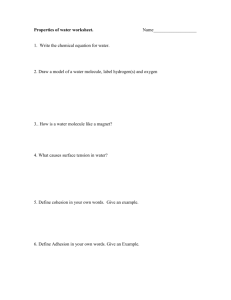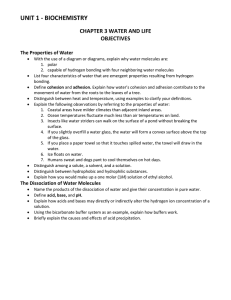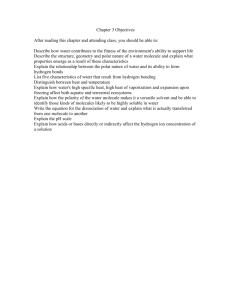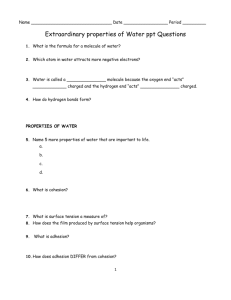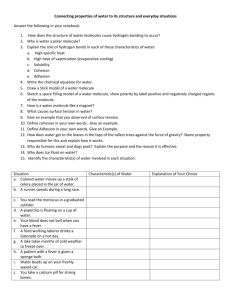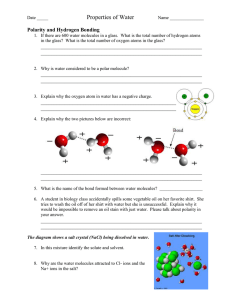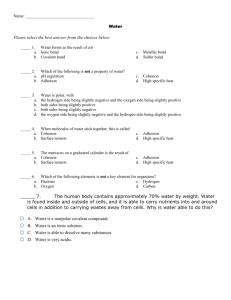Properties of Water
advertisement
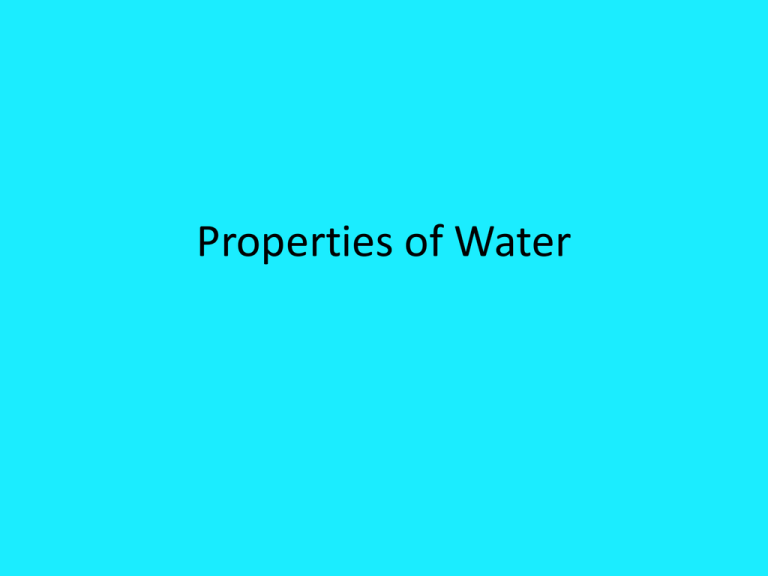
Properties of Water Water Polarity • Water’s chemical formula is H2O • The hydrogen atoms are “attached” to one side of the oxygen atom. • This results in a positive charge on the hydrogen side and a negative charge on the oxygen side of the atom. Water Polarity Continued • The uneven distribution of charge is called polarity. • Even though the poles of the molecule are charged, a water molecule has an overall charge of zero. Hydrogen Bonds • The slightly positive charge on the hydrogen of a water molecule causes hydrogen to attract slightly negative charged poles of molecules Hydrogen Bonds Continued • Hydrogen bonds hold water molecules together • Each water molecule can form a maximum of 4 hydrogen bonds • Hydrogen bonding gives water some of its extraordinary qualities: – Cohesive behavior – Resists changes in temperature – High heat of vaporization – Expands when it freezes Cohesion • Cohesion is the attraction between molecules of the same substance. • Water’s cohesion is responsible for molecules on the surface of water being drawn inward. This explains how insects walk on water. • Cohesion also helps water combat the force of gravity, allowing water to move through the roots and up the stem of a plant. Adhesion • Adhesion is the attraction between molecules of different substances • Adhesion helps water adhere (stick) to the walls of vessels, aiding a plant in drawing water out of the roots and up the stem. **Adhesion and Cohesion work together to allow for water movement against gravity in plants. This is known as capillary action. How do you think you would explain how these properties of water aid blood in traveling throughout the body? Surface Tension • Surface tension is a measure of the force necessary to stretch or break the surface of a liquid • This tension causes water to bead up on surfaces (glass, fabric) • The adhesion and cohesion properties of water are responsible for causing surface tension. Specific Heat is the amount of heat that must be absorbed or lost for one gram of a substance to change its temperature by 1oC. Three-fourths of the earth is covered by water. The water serves as a large heat sink responsible for: 1. Prevention of temperature fluctuations that are outside the range suitable for life. 2. Coastal areas having a mild climate 3. A stable marine environment Heat of Vaporization • Water has a high heat of vaporization • When you sweat, water pulls the heat away from your body to cool you off • The water actually contains some of the heat Identify one property of water that is beneficial to life on Earth and provide examples of how this property is beneficial. Universal Solvent • Water is called the “universal solvent” because it dissolves more substances than any other liquid • This means that wherever water goes, either through the ground or through our bodies, it takes along valuable chemicals, minerals, and nutrients
